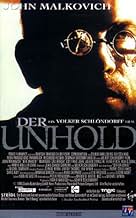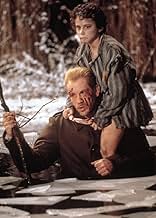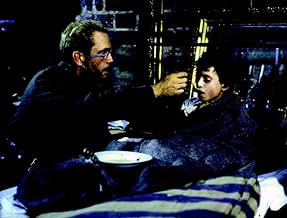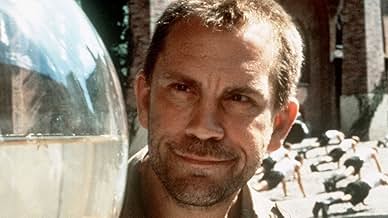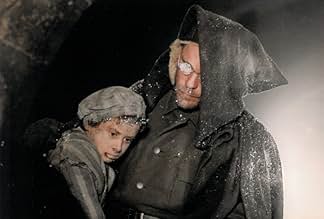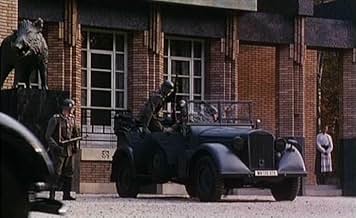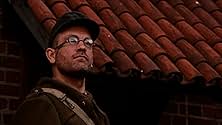Der Franzose Abel Tiffauges mag Kinder und will sie vor den Erwachsenen schützen. Fälschlicherweise als Kinderschänder verdächtigt, wird er als Soldat im 2. Weltkrieg rekrutiert, gerät aber ... Alles lesenDer Franzose Abel Tiffauges mag Kinder und will sie vor den Erwachsenen schützen. Fälschlicherweise als Kinderschänder verdächtigt, wird er als Soldat im 2. Weltkrieg rekrutiert, gerät aber sehr bald in KriegsgefangenschaftDer Franzose Abel Tiffauges mag Kinder und will sie vor den Erwachsenen schützen. Fälschlicherweise als Kinderschänder verdächtigt, wird er als Soldat im 2. Weltkrieg rekrutiert, gerät aber sehr bald in Kriegsgefangenschaft
- Regie
- Drehbuch
- Hauptbesetzung
- Auszeichnungen
- 1 Gewinn & 1 Nominierung insgesamt
Empfohlene Bewertungen
During Hitler's Putsch in 1923, Goring sustained a painful injury whose relief by means of morphine turned him into a drug addict nearly the rest of his life. This influence, in turn, made him "alternately elated or depressed; he was egocentric and bombastic, delighting in flamboyant clothes and uniforms, decorations, and exhibitionist jewelry." We see all these traits in Spengler's scenes, e.g. in his drunken alternation between a tirade and a blue funk at the fact that someone else had shot a stag that he wanted to shoot. When a soldier enters to bring him some really bad news, Goring is already so gloomy that he barely raises his hand from the table to salute, and his "Heil Hitler" is just a slurred grunt.
The article also establishes his corpulence and luxuriousness, to a point resented by his colleagues in the party. "His hunting interests enabled him to obtain a vast forest estate in the Schorfheide, north of Berlin, where from 1933 he developed a great baronial establishment" called Carinhall, full of artistic war booty, to which he retired whenever he could.
The film showed Goring as an often jovial man given, like Hitler, to occasional fits of imperious screaming. This behavior, according to one book I read recently, was to be expected of any top leader of the Third Reich not merely as a habit but as a deliberate technique. People outside of Germany were slow to take Hitler seriously as a threat because this conduct was so strange to them. They did not realize that German culture of the time regarded it as a standard part of the fatherly role. Therefore, as Hitler understood well, the more he screamed and shouted at his countrymen, the more closely they would identify him as a father figure and the embodiment of Der Vaterland.
Many superstitious beliefs have been associated with precious stones. The novel explains that Goring was not unique in imagining that plunging his fingers into a bowl of gems would drain away nervous energy and uncomfortable emotions. Other sources recount that when Hugo von Hofmannsthal's first poems appeared, under a pseudonym, they were so heavy with sensuous Weltschmerz that one critic declared they must have been written by an opulent old man while dipping his fingers in jewels. (He would soon be surprised that the poet was still a youth). So even this strange indulgence of Goring is in keeping with the ambient culture among those few who could afford the experience.
One could say much, much more about this complex film, but perhaps this elucidation of just one minor aspect suggests the multilayered care with which it has been put together.
The movie is spanning a few years of time and the rhythm is slow, as one would expect from a film made from a book, and, while a little boring and depressing, it is a nice movie.
Bottom line: imagine Forrest Gump in Europe. No humour, no hope, no cares in the world. Oh, except the war. ;)
This strange and original work is a French film about Nazi Germany done in English. There are no subtitles. Director Volker Schlondorff is German, the screenplay is by veteran French writer Jean-Claude-Carriere, who has scores of films to his credit including Bell de Jour (1967) and Valmont (1989), and the star is the American, John Malkovich, who plays a French simpleton named Abel Tiffauges who ends up as a servant in Field Marshall Herman Goering's hunting estate during World War II, and then later in a Hitler youth academy for boys.
Malkovich's Abel is enormously sympathetic because he has suffered but harbors no bitterness, because he genuinely loves children, and because he has a certain magic about him based on his childish belief that somehow he will survive any catastrophe. In a boy's home as a child he survives the brutality of a proto Goering-like fat boy, and then later as an auto mechanic he overcomes a false accusation of child molestation. Both of these little stories are vividly rendered and seem entirely realistic. Then begins Abel's war time adventures, and it is here that the story becomes, as some have observed, something of a fairy tale. Abel is able to leave his barracks at the prison to wander about where he meets a blind moose and then a German army officer at a deserted cabin in the woods. This leads to his being established at Goering's hunting estate, and from there to the Hitler youth academy where he is treated as a privileged servant. We see the Nazis as just another part of the bizarre personages of his world.
The depiction of Goering as a kind of self-indulgent Nero, living in opulence as the world burns, seemed entirely believable. The overall portrait of the Germans in an objective and balanced manner was refreshing and thought-provoking and one of the strengths of the film. The Nazi eugenicist is contrasted with the officer who was part of a failed plot against Hitler, both men enormously sincere and dedicated, the one unbalanced, the other unlucky.
This is not a film for those looking primarily to be entertained. This is a work of art, dark, uneven, and a bit curious.
This is the story of Abel, an affable simpleton from France with a love of children and animals (no, there are no undertones of pedophilia). Prior to WWII, he is wrongly accused and convicted of child molestation. While working in the work camps, he is captured by the Germans and through a series of events ends up as a prisoner of war worker in a training school for Hitler youth. He is emotionally seduced by the romantic notions of Hitler's national socialism and the great devotion to the fatherland that is being taught there. And of course, he loves working with the boys. The Germans notice this and how much the boys like him as well, so they ask him to recruit more boys for the school from the local countryside. Things go along well until the Russians invade and the only defense of the school must be made by the students (who are well trained in the art of war).
This is a terrific story that gives us a more realistic look inside Germany during the war. No, it wasn't an idyllic free society. But it wasn't exactly a factory for mechanized inhuman killers as it has been routinely portrayed either. We come to understand that what we considered evil was being presented to the children in terms that seemed good and noble. They felt as if they were on an idealistic quest, not on a diabolical mission of subjugation.
The direction of this film was expertly done. Volker Schlondorff's presentation of the story, though slow moving at times, offered an excellent character study of Abel and was patient in proffering revealing looks at the people and the feelings of those around him.
Malkovich is fantastic as the naïve and slow witted Abel. He is wonderfully childlike and sincere in his portrayal; reminiscent of his role in Of Mice and Men'. This is the best I can remember him in quite some time.
This is a poignant and compelling film of substance. I rate it a 9/10. The sophisticated viewer will enjoy it.
A great deal of the film is artfully done, with many subtle displacements to stimulate emotions in the viewer. Although the oft-mentioned 'front line' is never seen, instead we are faced with the massacre of hundreds of wild animals. The childhood friend of Abel returns to him in the form of the military official in the forest, and yet, Abel does not make a connection beyond a vague similarity. He is oblivious to the extravagant decadence of dipping one's hands in jewels, or keeping a wild cat for pleasure. In his simpleton's way he meanders through a landscape of potential knowledge, yet learns nothing. It is the viewer who is given the chance to learn what he can't. Unfortunately, this schema reminded me a bit too much of Forrest Gump. However, the film speaks a great deal to the fairy-tale effects of idealism and propaganda on young children, as finally Abel is cut off by the very boys he loved, their allegiance to a greater unseen force much stronger than their understanding of fellow man.
Wusstest du schon
- WissenswertesGerard Depardieu was slated for the lead role
- PatzerPrior to the school fire, a caption says "Paris 1925". Upon his arrest as an adult, Abel, through his narration, remembers the fire as having happened "twenty years ago". This would place his adult scenes in 1945, but when he joins the French army after his arrest it is before the German occupation of Paris which would place his arrest in 1940. However, Abel is slow-witted and possibly does not have an accurate sense of time.
- Zitate
Count von Kaltenborn: This whole beautiful country, to which we have given our souls, is utterly doomed. It's going to be wiped out of human memory. Our entire heritage, even our name, our ancestors' names, wiped out, all wiped out!
- VerbindungenFeatured in Hollywood Profile: John Malkovich (1998)
Top-Auswahl
- How long is The Ogre?Powered by Alexa
Details
- Erscheinungsdatum
- Herkunftsländer
- Sprachen
- Auch bekannt als
- The Ogre
- Drehorte
- Produktionsfirmen
- Weitere beteiligte Unternehmen bei IMDbPro anzeigen
Box Office
- Bruttoertrag in den USA und Kanada
- 50.935 $
- Weltweiter Bruttoertrag
- 50.935 $
- Laufzeit
- 1 Std. 58 Min.(118 min)
- Farbe
- Sound-Mix
- Seitenverhältnis
- 1.85 : 1

